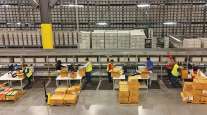Bloomberg News
World’s Biggest Brands Adopt Checklist to Protect Seafarers

[Ensure you have all the info you need in these unprecedented times. Subscribe now.]
Unilever Plc and other big retail brands are among consumer giants adopting a toolkit to audit their shipping supply chains in an effort to help bring seafarers stuck on commercial vessels back home and eliminate human rights risks.
The voluntary initiative, which launches later this week, calls on companies that put cargo on shipping containers to address problems stemming from government-imposed restrictions on crew changes. It’s estimated more than 200,000 crew around the world are still stuck on vessels beyond the expiration of their contracts and well past globally accepted safety standards.
The program — part of a project by the U.N. Global Compact — is also expected to be endorsed by the powerful Consumer Goods Forum, a body that counts hundreds of the world’s biggest consumer companies as members, including Coca-Cola Co., Marks & Spencer Group Plc and Nestle SA.
“Businesses, from multinational firms to global brands, have a responsibility to respect the human rights of seafarers as workers along their supply chain,” said Sturla Henriksen, a U.N. Global Compact special adviser for sea issues. “There is a vast gap between business aspiration and business action on human rights. This tool seeks to address that.”
Practical Steps
Any company that puts any sort of cargo on ships will be encouraged to use the checklist, which includes asking shipowners and those who charter space on vessels to support crew changes and ensure clauses aren’t being added to contracts that prevent crew relief.
Earlier, Bloomberg reporting found that some big commodities firms are avoiding hiring certain vessels or imposing conditions that block crew changes to relieve exhausted seafarers. Brands are also being encouraged to work with the union and shipping chamber to request a detailed audit of their supply chain — down to the ships that are being used to ferry their cargo as part of the human rights due diligence initiative.
Unilever, which like Bloomberg was able to review the program’s details before its launch, plans to adopt the toolkit, according to Chief Supply Chain Officer Marc Engel. The company last year spearheaded a letter urging world leaders to help stuck seafarers. This latest initiative spells out practical, concrete steps that all businesses can take to make sure their sea logistics address human rights flags, Engel said.
Engel said the toolkit should prompt some frank discussions with suppliers as well as encourage dialogue around costs within the shipping industry, which is fragmented and often employs a network of shipowners, charterers and brokers.
Since the pandemic, some countries and their governments have either stopped or limited access for ships to conduct seafarer changes in a bid to prevent the spread of COVID-19. A Bloomberg investigation published in September found numerous violations of international maritime law designed to protect seafarers, including allegations of unpaid overtime and insufficient medical attention. There’s fear governments may again tighten restrictions as countries try to contain mutant virus strains.

The year is 2039. Zero-emission, electric heavy-duty trucks roll past you on the highway. Charging ports are now commonplace at terminals and truck stops. Diesel-powered vehicles are becoming a thing of the past. You sit and wonder: How did we get here? Here, in 2021, Daimler Trucks North America's head of eMobility speaks to RoadSigns. Hear a snippet above, and get the full program by going to RoadSigns.TTNews.com.
The International Chamber of Shipping, the industry association that represents shipowners, is on board with the new initiative, said Secretary General Guy Platten. “The crew change crisis is far from over,” he said. The initiative also calls on companies to put pressure on governments to support the industry, which Platten says will help.
Some of those brands that have made the effort to dig into their supply chains have been surprised.
Fashion retailer TFG London conducted an investigation of its supply chain in 2020. It asked its shipping partners for a detailed map of the logistics network at sea and sought help from the seafarers’ union to undertake welfare checks on some of the ships carrying its cargo. The company found that five vessels didn’t have agreements with the union.
“We felt powerless to act as we didn’t have meaningful tools or leverage to respond to this crisis,” said Francesca Mangano, TFG London’s corporate social responsibility and sustainability executive. “This tool is set to drive change.”
Separately, a number of firms, including MSC Mediterranean Shipping Co. S.A., have launched an emergency relief fund. Targeting $1 million, the aim is to support seafarers and their families in India. The escalation of COVID-19 cases in the South Asian country has prompted some major ports to prohibit changes for crew with a recent travel history to India, Bangladesh, Nepal, Pakistan and Sri Lanka.
Want more news? Listen to today's daily briefing below or go here for more info:




